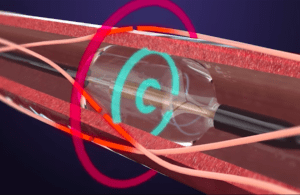
ReCor Medical announced today that an FDA panel has voted in favor of the safety and efficacy of its Paradise ultrasound renal denervation (RDN) system for treating hypertension.
Yesterday, the Circulatory Systems Devices Panel of the FDA’s Medical Devices Advisory Committee voted 12–0 in favor with regard to safety and 8–3 in favor, with one vote abstaining, for the efficacy of the system to treat high blood pressure.
In addition, the committee voted 10-2 that the Paradise system’s benefits outweigh the risks. If the Paradise system secures an FDA PMA, it would be the first renal denervation device in the U.S. indicated to reduce blood pressure in patients with uncontrolled hypertension, according to ReCor Medical, which is part of Otsuka Medical Devices.
The FDA advisory panel today is reviewing Medtronic’s Symplicity Spyral renal denervation system. As with ReCor’s system, it’s a catheter-delivered system that treats the nerves leading to the kidneys, but Medtronic’s device uses radiofrequency energy instead of ultrasound. Leading up to this week’s meeting, analysts have expected that Medtronic will also receive good news. If that is the case, it will validate years of challenging work involving clinical studies analyzing the technology. Recor’s clinical trial met its primary endpoint for efficacy, while Medtronic’s RDN trials have not met their efficacy target
So far today, Medtronic has faced tough questions from the FDA panel. (Stay tuned for more updates.)
ReCor Medical’s system could have a significant impact
For their part, ReCor Medical officials were grateful to receive the FDA review panel’s recommendation.
“We will continue to work closely with the FDA in advance of our anticipated PMA approval and feel confident in the impact that Paradise Ultrasound RDN could have in addressing a significant unmet need,” ReCor Medical CEO Lara Barghout said in a news release.
The PMA submission included data from three clinical trials in the company’s Radiance Global Program. The program involved independently powered, randomized, sham-controlled clinical trials of the Paradise Ultrasound RDN system. More than 500 people with mild-to-moderate or resistant uncontrolled hypertension were involved in the studies.
Dr. Ajay Kirtane, a professor of medicine at Columbia University, is a co-primary investigator in the Radiance Global Program. He discussed the need for renal denervation treatments: “Hypertension is one of the leading causes of cardiovascular morbidity and mortality, and despite the widespread availability of effective medications and lifestyle modification, rates of blood pressure control are still poor.”
The Paradise Ultrasound RDN system has a CE mark in the EU for the treatment of hypertension and is an investigational device in the United States and Japan.